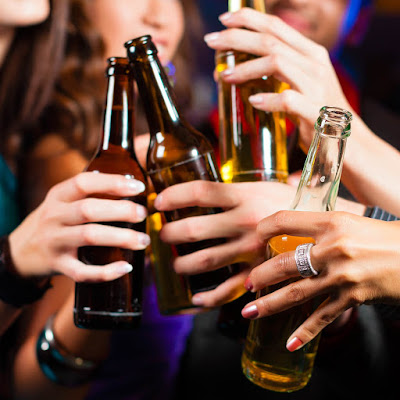"The Right to Drink"
By: Kyle Langley
When a citizen of the United State of America turns 18
years old, do they receive all of the rights of being an American citizen? No.
18 year olds are entitled to almost every right, with alcohol being the
biggest exception. Alcohol drinking age has been in debate for many
generations with people across the political spectrum taking their own
independent side.
Since the birth of the United States, the legal age to
drink alcohol has always been 21 years old (Office of Science Policy Analysis). However, the
age at which most citizens earn all of their rights is 18 years old. This
difference in rights has been a prevalent issue in US politics and in the
average American household.
Supporters of lowering the age claim that it is
outrageous to legally considered an adult, yet not have the right to drink
alcohol. They ask critics, “If a person is old enough to vote for the
leader of their nation, fight and die in service of their country, and be
legally considered an adult, should not they have the right to consume
alcohol?” Logically, this point makes sense. If a person is legally
considered an adult and receives almost all of their rights at the age of 18,
they should also be allowed to consume alcohol. The point of the statement
is to show that the law is not about age, but about maturity.
Maturity is often hard to make a law about. After
all, a 15 year old should be more mature than an 8 year old. Yet, there are a
few 18 year olds who are more mature than some 21 year olds. Is the
difference of three years at that age really a day and night difference?
After all, most alcohol related issues stem from lack of responsibility
not tolerance.
The supporters claim lowering the age will improve public
safety and lower alcohol related crime (Cognac). They assert that
many kids already drink alcohol before the age of 21. Since it is illegal
for the kids to do so, they will go behind their parent’s backs to drink
alcohol in a “Non-Safe” environment. If the law were to be changed, these
young adults would be drinking alcohol in the presence of responsible
adults thus reducing the risk to the young adults. According to
proponents of lowering the drinking age, drunk driving and underage drinking
will be lowered. 8% of of underage citizens drive after drinking alcohol
and 18% binge drink alcohol in the United States (U.S. Department of Health
& Human Services). Some of these citizens must drive home because they were
not supposed to be out drinking in the first place. Since most of those
people in the 18% percentile are over the age of 18, lowering the age of
drinking will lower the number of underage drinking crimes.
No matter what age someone may be, alcohol is dangerous
as it affects the liver, hormones, and brain (CDC.). The biggest effect that alcohol has is
in on the brain. At 18 years of age, the brain is still greatly
developing. Scientist have determined that at 21 years of age, the
brain’s development is incredibly reduced (CDC.). Alcohol affects the brain much more at
18 years old than 21 years old. Parents, scientists, and politicians have
used this fact to keep the drinking age set to 21.
After 200 years of having the drinking age set to 21
years old, many people want and fight to lower it to 18 years old like the rest
of the world. Almost all laws recognize and give all responsibilities to
citizens at 18 years old instead of 21 years old. This irregularity has
caused much confusion and debate for American citizens. Lastly, the medical
evidence and the Center for Disease Control urges the American government to
keep the age restriction. However, American citizens are allowed to
participate in many dangerous activities and put themselves in harm’s way at 18
years old. The alcohol drinking age should be lowered to keep our laws
consistent and ensure that 18 year olds are considered fully adults in the eyes
of the law.
Sources:
CDC. "Alcohol and
Public Health." Centers for Disease Control and Prevention. Centers
for
Disease Control and Prevention,
31 Mar. 2017. Web. 03 May 2017.
Office of Science Policy
Analysis. "Underage Drinking." National Institutes of Health.
U.S. Department of Health and
Human Services, 01 Oct. 2010. Web. 01 May 2017.
Choose Responsibility.
"DRINKING AND CULTURE: INTERNATIONAL
COMPARISONS."
Choose Responsibility. Choose Responsibility, 23 Mar. 2012. Web. 03 May 2017.
U.S. Department of Health
& Human Services. "Fact Sheets - Underage Drinking." Centers
for
Disease Control and Prevention.
Centers for Disease Control and Prevention, 20 Oct. 2016. Web. 03 May 2017




